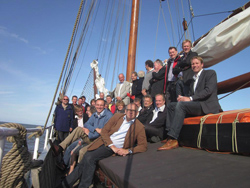Synergy for Energy - the Energy Academy
In early October this year, the Energy Academy received its initial funding of 6 million euros from the Ministry of Economic Affairs as part of the so-called Green Deal - a governmental programme promoting green growth and a sustainable society in the Netherlands. The Academy is an ambitious ten year plan to expand the role of Northern Netherlands as a prominent centre for knowledge, technology and innovation about energy. The existing extensive expertise in the area of energy sustainability, spread over a number of departments at the University of Groningen, will be a major component in fuelling the engine of the Energy Academy.
To tell us more about the Energy Academy, we spoke to Dr Anne Beaulieu - the project manager of Groningen Energy and Sustainability Programme (GESP) at the University of Groningen, and a member of the working group developing the Energy Academy.
Where did the idea for the Energy Academy originate?

“The idea about something like the Energy Academy came first from the industry. Gertjan Lankhorst, the CEO of GasTerra envisioned the need to enhance the workforce engaged in the field of energy, not only in the region, but in the Netherlands as a whole. About a year ago, he presented a plan for the Energy Academy to the prime minister Mark Rutte, outlining the need for a series of investments in both teaching, as well as research and facilities in the area of energy sustainability. As soon as the idea gained some exposure, other parties saw the prospects for research and innovation around the topic of energy.”
Which partners are participating?
“Currently, major partners in the projects are the University of Groningen, Hanze University of Applied Sciences, the province and municipality of Groningen. As well as theEnergy Valley Foundation - a network of government bodies, universities, and private partners collaborating on creating opportunities for sustained growth in the energy sector in the Northern part of the Netherlands. So, now, just a year after it was conceived, the Energy Academy is poised to become the major centre for energy in the Netherlands, and an internationally renowned hotspot.”
What are the energy issues that the Energy Academy will focus on?

There are five major research themes.
Tomorrow's Energy; This theme will focus on creating long-term strategies as to how we will produce and consume our energy and on renewable energy sources The University of Groningen conducts world class fundamental, strategic and applied research in both these areas. Of particular importance is the Universitys research in the fields of material science and chemistry of organic solar cells. So, the Energy Academy has a solid base on which to build and develop its first theme.’
Gas; and here, obviously, we can rely on the long history of the region as a gas provider.
Smart Grids; here we will work not only on finding ways to converting the conventional grid into a sensing network, but also on finding new ways of handling that information in a way that involves the user. Providing the right feedback to the user may have a significant influence on demand and consumer patterns which can really help in solving a lot of our energy problems.
Emissions and Reduction; here, one of the topics is carbon emissions trading. Again, we can rely on the extensive expertise and knowledge that already exists in the Centre of Energy Law at the University of Groningen. You can already see the importance of interdisciplinary insight, and that would be unique to the Energy Academy.
Energy Savings and Efficiency; is focusing on what we can do in terms of infrastructure, how to make resource use more effective, but also how to set up things at a social level - whether it's in terms of regional planning or economics, or user behaviour.
Groningen has a history of being a centre for excellent research and technology innovations in the energy sector. How would the Energy Academy strengthen this position?
“It is true that the region is strong in energy. The natural gas deposits in Groningen have brought about the currently existing pool of expertise and infrastructure. This is a great starting point for the Energy Academy. Looking into the future though, we need to come up with a paradigm shift interms of energy resources and consumption, in order to be sustainable. To achieve this, we need changes to the energy system at a more fundamental level. For that, we need to look at the system as a whole, trying to understand not only the individual components but also the links between them. We really need people with different kinds of knowledge from different disciplines working together to understand how sources of energy translate into infrastructure, distribution and consumer patterns. This not only includes technical people and policy makers, but also businesses who are involved in energy distribution and services, and development of energy infrastructure. And that's what the Energy Academy will be. First, it will be a cross-pollination across diverse disciplines ranging from technical and engineering to social and legal. Second, it would translate that broad knowledge and ideas into practical applications with the help of our business and government partners. We hope to provide a very broad expertise through the Energy Academy, and this is a unique contribution to the growth of the energy sector in the region.”
What will the Energy Academy offer to the young and enthusiastic minds of tomorrow?
“There are at least two very new things that the Energy Academy would like to do. One is to think about creating new jobs and disciplines that will arise with the diversification of the energy sources we use. Let's say one has to know if a windmill at sea is functioning properly - then there is a new set of issues and problems that need to be solved. In order to do that, experienced workers and trained professionals will need a new set of skills. This is something the Energy Academy wants to offer to young people - a good fit between the needs for sustainable energy development and the kind of training that is needed to meet those needs. Also, we will concentrate on teaching the skills required to build bridges between different specialists with different backgrounds and expertise. We would like to create a context in which it is very easy and logical to look beyond one's own field of specialty.”
How can one become a part of the Energy Academy?
“There are a number of ways to get involved with the Energy Academy. We plan to provide an environment for fundamental and applied research in a diverse set of fields related to energy. Students will get their degrees from our partner institutions: the University of Groningen and the Hanze University of Applied Sciences. The Energy Academy will also offer specific activities like lifelong learning, business and executive initiatives and much more. Having a lot of business institutions as partners is very helpful in setting up the stage for a variety of internships for students too.”
When will the Energy Academy open its doors?
“The plan is to start as early as September 2012. The initial phase will involve consolidating existing activities, intensifying collaboration with businesses, and getting the partners to know each other and work together. Then we'll be developing our teaching activities and curriculum. Next, we'll develop the necessary physical infrastructure for research and innovation. This will be a new centre on the Zernike Energy and Science Park, where facilities will be clustered in order to provide an environment for collaborations between partners from universities, private businesses and government, and where research, testing, and implementation of innovative energy solutions will take place.”
What makes the Energy Academy unique?
"There are one or two centres that do focus specifically on energy, but they are nowhere near the Energy Academy in terms of the breadth of expertise that we plan to offer. They might be focused on knowledge across different engineering fields, for example. In that sense the Energy Academy offers a much richer constituency. The Energy Academy won't really be only a research institution. We are trying to create a strong link between teaching, research and innovation from the very beginning."
What would make the Energy Academy a success story?
"We have a goal that ten years from now, over 20% of the student population in Groningen will be involved in the Energy Academy in one way or another. The Energy Academy would be a success if young people come to us, because they believe they can realize their ambitions here."
More news
-
15 September 2025
Successful visit to the UG by Rector of Institut Teknologi Bandung
